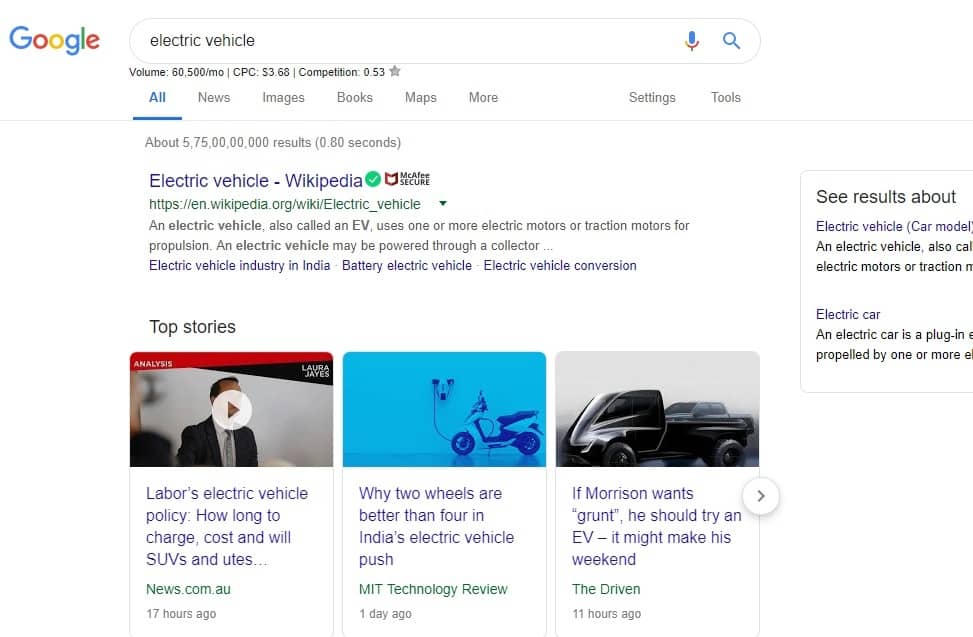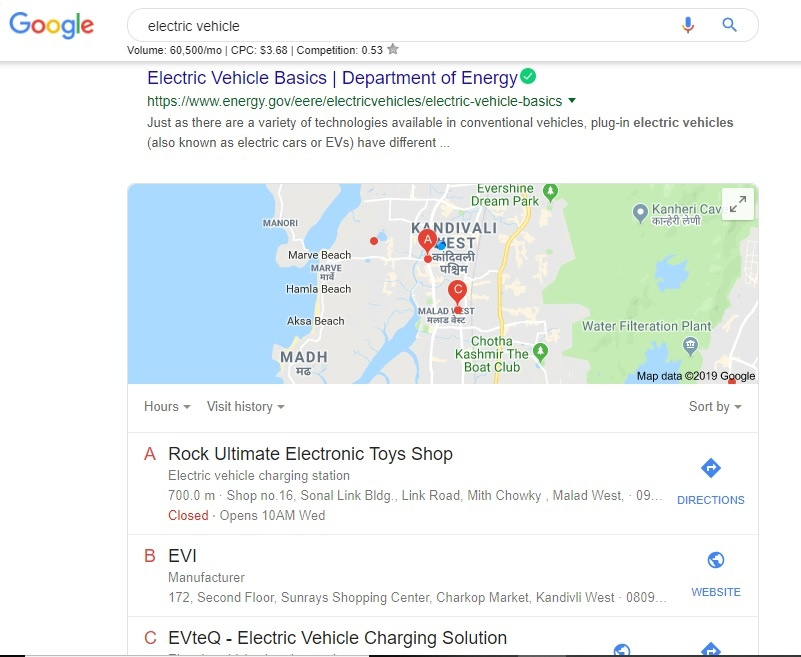Before understanding what exactly keywords are, let us first understand how you search on the internet.
When you want to search for anything on the internet, what do you do?
1. Simply type your query in the search box
2. Get relevant websites about your query (Search Engine Results)
3. Click on a website (result) and
4. You are good to go!
Sounds magical right?
Do you know what created the actual magic?
“THE QUERY YOU PUT IN THE SEARCH BOX”
This query was your “keyword” for the search engine.
What are Keywords?
The words which are used to search for something on search engines are the keywords.
For example, If consumer types “buy books” in the Google search box, then the keyword or key phrase is “buy books”.
On the basis of searched keywords, Google will display the search results. Hence, it becomes very important to understand what are keywords in digital marketing and their importance in SEO.
Keywords form the basis for digital marketing campaigns and are not just restricted to Search Engine Optimization. They are the building blocks for your SEO and a very important On-Page SEO factor.
The goal of businesses is to get discovered on the internet.
People use search engines to find products and services. And, a digital marketing strategy for a business is successful if it is discovered.
Different people have different ways to search, but the concept of search remains the same.
A person might search “Electric Vehicle”. What do you understand by this?
Is the person willing to buy an electric vehicle? or maybe he just wants to know about what electric vehicles are? or even maybe he wants to repair the electric vehicle which he has.

The intentions can be multiple, but when a person queries the search engine with the keyword “Electric Vehicle”, the search engine will provide the most relevant and optimized results for the searched keyword.

But, a wise person will search as per his intentions. Suppose, he wishes to buy an electric vehicle, then one of the possible searches he might make is by using the phrase “buy electric vehicle”. You can see the search results below.

Here, Google lists the local dealers located in the vicinity.
And, any business will like to be discovered here. As you scroll down, you can also see various websites. The websites discovered here were optimized for the keyword “buy electric vehicles” and hence ranked higher.
Importance of Keywords
By now, it is very clear that Keyword is a word that describes the content of the page. It let the visitor and search engine know what the page is all about.
Search engines look at the quality of the content on a page and this also includes the words used on that page. If a website is not having proper keywords, it will not be treated as a good website.
Also, if a website is stuffed with just good keywords, without any good quality content then too the website is treated as a bad website.
Not using proper keywords or using the wrong keywords would mislead people. And, Google hates when your website misleads. Who would not hate it?
So, proper keyword research should be done before finalizing the keywords and the “target keywords” must match the content and the goal of the website.
A good combination of content, proper keywords, and good website architecture can boost the SEO of a website.
Using Keywords for SEO
Many people still get confused between keywords and meta keywords.
The meta tags in HTML are used to describe the content of the page. They tell the search engines what the page is all about. They provide metadata (data about data) of the content of the page. But, they are not visible on the page.
The meta tags have several attributes like the description, keywords, author, viewport, etc. Out of the several attributes, the meta keywords were widely used for SEO.
But, then people realized that Google is not using meta keywords. Though Google considers the meta description tag, but meta keywords are ignored.
Should you use meta keywords?
The answer is NO. Because Google has officially announced that meta keywords are not being used by it for ranking websites.
But, this doesn’t mean that Google does not use meta tags at all. It uses certain meta tags and the various meta tags which Google understands can be found here – Meta tags which Google understands
How to use keywords?
Though keywords cannot be used in the meta keywords section, they can be used at several other places.
Keywords can be used in Page Titles, Meta Descriptions, Subheadings, URLs, Content of the Page, Link Anchor Text, within descriptive alt attributes for images, and so on.
Using keywords at these places doesn’t mean you use them excessively. Excessive usage of keywords in web content and meta tags is known as Keyword Stuffing.
Keyword Stuffing is an unethical practice and should be avoided. Use keywords wisely and in the right place.
This was about using the importance of keywords and using them, but how to find them? By doing keyword research.
Keywords Research
Knowing the fact that keywords place a key role in SEO, one would love to use them in a proper way. In order to use keywords, you must discover the best keywords for your website or blog.
This process of finding the relevant keywords for your website is known as Keyword Research.
The research starts by listing down the keywords related to your domain or the keywords for which you want to rank.
For example, if you are selling square pizzas in Mumbai, you would love to be discovered when someone searches for “Square Pizza in Mumbai” or “Best Square Pizza in Mumbai” and so on. Make a list of such phrases.
The next step is to find out how feasible it is to rank for the keywords listed by you. There might be other competitors who are already ranking for some keywords.
So, how to identify this, and how to proceed?
A keyword research tool comes to the rescue.
There are several keyword research tools like Google Keyword Planner, Moz Keyword Explorer, Ubersuggest, etc.
You can also use Google search result suggestions & Google Trends for the research.
Short tail keywords vs Long tail keywords
The keywords entered by a person on the search engine reflect his intention of the search.
For example, if one enters “jacket”, it doesn’t specify whether he wants to buy a jacket, sell a jacket or simply know what a jacket is.
On the other hand, a person with a specific intention of buying a jacket will rather search for “buy leather jacket” or if more specific “buy best brown leather jacket under 3000 rupees”.
The first keyword “jacket” is a short-tail keyword while the other two are long-tail keywords.
Short tail keywords don’t give a clear idea of the intention of the user as they are brief and usually contain a general, non-specific term. This leads to lots and lots of results that may be irrelevant to satisfy the requirement of the user.
Long-tail keywords are detailed and specific terms that give a clearer picture of the intention of the user. This helps the search engine in displaying more accurate results rather than what it does in the case of short-tail keywords. Long-tail keywords should be a part of your keyword strategy.
What ahead?
You learned about what are keywords, their importance, research, and usage & the difference between short-tail and long-tail keywords.
This is a good to start but not enough.
Identifying the right keywords as per the domain is an art and it comes with practice.
Learn to use keyword tools, analyze the search volume and competition of the keywords and select the best keywords. Because a website or blog without quality keywords will find it very difficult to rank despite having a good topic.
Happy Learning!
You might also like:

good information thank you…
The blog post is very well written, it really helped me a lot in understanding more about keywords.
Best of Luck for future works.
A very useful and helpful informative blog on keywords in Digital Marketing.
Thanks for sharing such an informative blog.
Thank you Navya!
It was a very nice and interesting article. Thanks for sharing.
A very useful and helpful informative blog on keywords in SEO & Digital Marketing.
Thanks For Sharing .